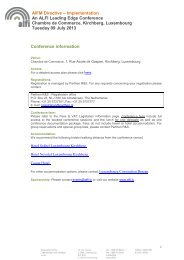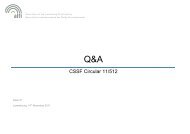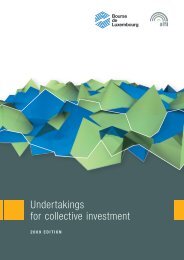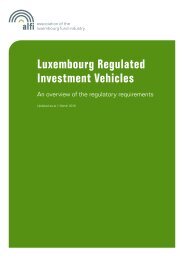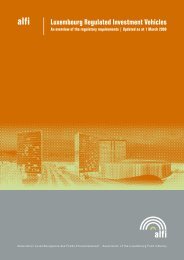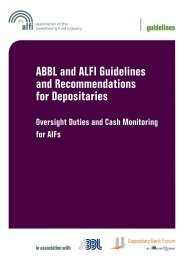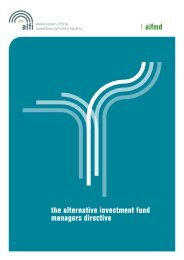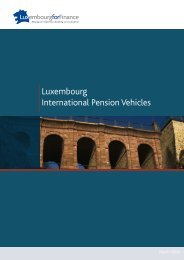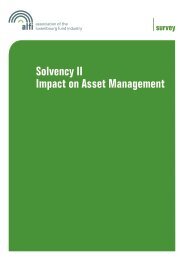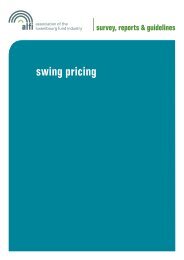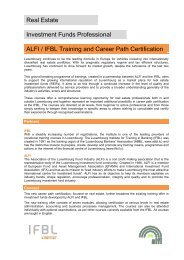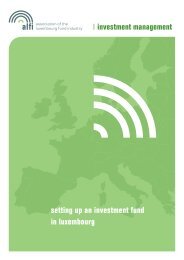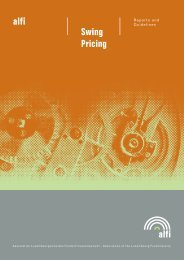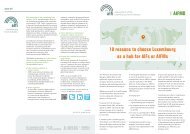ALFI UCITS IV implementation project – KID Q&A Document
ALFI UCITS IV implementation project – KID Q&A Document
ALFI UCITS IV implementation project – KID Q&A Document
Create successful ePaper yourself
Turn your PDF publications into a flip-book with our unique Google optimized e-Paper software.
Q. Does the investment company or the management company have an obligation to monitor distributors andintermediaries for evidence that the <strong>KID</strong> is being delivered to investors?A. The obligation to monitor distributors and intermediaries will depend upon the nature of the distribution network –whether, for example, a party falls under the scope of Art 80(1) or 80(2) of the <strong>UCITS</strong> Directive and whether othernational laws and regulations or European laws such as the MiFID Directive are applicable. Practitioners would bewise to take legal advice in this and similar matters. In the Luxembourg Law of 17 December 2010 (implementing<strong>UCITS</strong> <strong>IV</strong>), Art 110(f) says, "Management Companies are authorised to delegate to third parties [in which] case […]measures must exist which enable the persons who conduct the business of the management company to monitoreffectively at any time the activity of the undertaking to which the mandate is given." For a Luxembourg managementcompany, we therefore think that it would be appropriate to monitor distributors acting under such a delegation, whowould seem to be acting under Art 80(1) of the <strong>UCITS</strong> Directive. Conversely, we see no obligation under theLuxembourg law to monitor an intermediary or product manufacturer (e.g., wrap, structured product, fund of fundsmanager, etc) to whom the management company has made no such delegation and who would seem to be actingunder Art 80(2) of the <strong>UCITS</strong> Directive. Where a monitoring obligation exists, we think that it would be appropriate torely upon a due diligence review of the distributor's process and records, which would be performed when therelationship is first established and regularly thereafter.Q. In certain cases, distributors or intermediaries may be seen as investors, e.g., if they place an order ontheir own behalf, or act as nominees. In these cases, promoters have a direct relationship with them; they areregistered as shareholders in the fund's register. Under the terms of the law, should we consider these partiesto be investors or intermediaries?A. We recommend practitioners to discuss this with such parties. They may agree to be treated as intermediaries. If noagreement can be reached, they should be treated as investors.Q. What procedures would you recommend to management companies in order to get the proof of theirprovision of KIID to their distribution partners?A. This is a matter between each management company and its distribution partners.Please note that the following questions and answers deal with particularly complex issues, involving manydifferent possible operating models and investor circumstance. The answers are not necessarily definitiveand they might not be suitable for every circumstance. They are not meant to establish an industry standardor a guide to best practice. Practitioners must decide their own policy in respect of the provision of the <strong>KID</strong>.Q. Should practitioners amend application forms to obtain from the investor a declaration that it has receivedthe <strong>KID</strong> for the proposed initial investments? Should practitioners introduce order forms to obtain from theinvestor such a declaration in respect of each subsequent investment?A. It is the practitioner's responsibility to provide the <strong>KID</strong> to the investor. An investor's declaration of receipt is nosubstitute for provision but it may provide a practitioner with some assurance that the relevant <strong>KID</strong> has been provided.The practitioner may therefore choose to add such a declaration to the initial application form and the subsequentorder form. The practitioner should take care to ensure that the investor can understand the meaning of thedeclaration, that it may give it freely and explicitly, and that it may choose not to give it. It may also be interesting toamend the initial application form to obtain the investor's consent to receive the <strong>KID</strong> in a durable medium other thanpaper or by means of a website (Art 38 of EU Regulation 583/2010). In that case, it would be necessary on theapplication form to solicit the investor's explicit consent to receive the <strong>KID</strong> in that durable medium and to record theinvestor's e-mail address.Q. If an investor's relationship with a <strong>UCITS</strong> pre-dates the <strong>KID</strong> regime, may participants assume some form of"grandfather" status for that investor's holdings in that share class, under which the investor may add to itsinvestments without any obligation upon the participant to provide the relevant <strong>KID</strong> to the investor?A. There is no requirement to provide the first edition of a <strong>KID</strong> to investors whose initial investment in a <strong>UCITS</strong> predatesthe <strong>KID</strong> regime. Practitioners may consider providing the first edition of a <strong>UCITS</strong>' <strong>KID</strong> and an explanation of the<strong>KID</strong> regime to such investors if they wish. The advantages of doing so include (1) removing any possible doubt thatthe investors' subsequent operations on the <strong>UCITS</strong> comply with the requirements of the <strong>KID</strong> regime; (2) providinginvestors with important information about the <strong>UCITS</strong>, such as the SRRI and risk narrative; (3) providing relevantexamples when informing investors about the <strong>KID</strong> regime and how it will affect the way that they place orders for the<strong>UCITS</strong>.<strong>ALFI</strong> <strong>KID</strong> Q&A, Issue 1314, 11 April25 September 2012 Page 56



